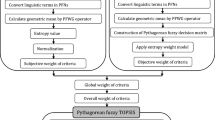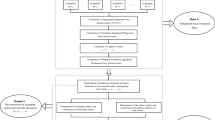Abstract
The theory of Pythagorean fuzzy set (PFS) allows the sum of membership and non-membership degrees of an element to exceed one but the sum of their squares is less than or equal to one, therefore, it provides the wider range for decision experts to express the fuzzy information. The present work aims to develop a Pythagorean fuzzy information-based multi-criteria group decision-making (MCGDM) approach for assessing the multi-criteria metaverse incorporated sharing economy applications. The proposed MCGDM approach is divided into four stages. First, the concept of Pythagorean fuzzy Wasserstein distance measure is presented to avoid the limitations of existing Pythagorean fuzzy distance measures. Some examples are discussed to illustrate the effectiveness of proposed Pythagorean fuzzy Wasserstein distance measure in comparison with existing measures. Second, a total support degree-based procedure is presented to find the decision experts’ weights. Third, a symmetry point of criteria (SPC) approach is presented to determine the weights of criteria. Fourth, a hybrid Pythagorean fuzzy information-based ranking approach is presented to deal with the MCGDM problems, wherein the information about the criteria and decision experts are completely unknown. Further, the proposed ranking approach is executed on a case study of metaverse incorporated sharing economy alternatives assessment, which expresses its applicability and effectiveness. Comparison with existing Pythagorean fuzzy ranking approaches are discussed to validate the advantage of the developed approach.
Similar content being viewed by others
References
Alrasheedi AF, Mishra AR, Rani P, Zavadskas EK, Cavallaro F (2023) Multicriteria group decision making approach based on an improved distance measure, the SWARA method and the WASPAS method. Granul Comput. https://doi.org/10.1007/s41066-023-00413-x
Atanassov KT (1986) Intuitionistic fuzzy sets. Fuzzy Sets Syst 20:87–96
Biswas A, Deb N (2021) Pythagorean fuzzy Schweizer and Sklar power aggregation operators for solving multi-attribute decision-making problems. Granul Comput 6:991–1007
Chaurasiya R, Jain D (2022) Pythagorean fuzzy entropy measure-based complex proportional assessment technique for solving multi-criteria healthcare waste treatment problem. Granul Comput 7:917–930
Che Y-C, Wang L-H, Chen S-M (2006) Generating weighted fuzzy rules from training data for dealing with the iris data classification problem. Int J Appl Sci Eng 4(1):41–52
Chen S-M, Fang Y-D (2005) A new method to deal with fuzzy classification problems by tuning membership functions for fuzzy classification systems. J Chin Inst Eng 28(1):169–173
Chen S-M, Jian W-S (2017) Fuzzy forecasting based on two-factors second-order fuzzy-trend logical relationship groups, similarity measures and PSO techniques. Inf Sci 391–392:65–79
Chen S-M, Niou S-J (2011) Fuzzy multiple attributes group decision-making based on fuzzy preference relations. Expert Syst Appl 38(4):3865–3872
Chen S-M, Wang N-Y (2010) Fuzzy forecasting based on fuzzy-trend logical relationship groups. IEEE Trans Syst Man Cybern Part B 40(5):1343–1358
Chen S-M, Ko Y-K, Chang Y-C, Pan J-S (2009) Weighted fuzzy interpolative reasoning based on weighted increment transformation and weighted ratio transformation techniques. IEEE Trans Fuzzy Syst 17(6):1412–1427
Chen S-M, Randyanto Y, Cheng S-H (2016) Fuzzy queries processing based on intuitionistic fuzzy social relational networks. Inf Sci 327:110–124
Deveci M, Gokasar I, Castillo O, Daim T (2022) Evaluation of metaverse integration of freight fluidity measurement alternatives using fuzzy Dombi EDAS model. Comput Ind Eng 174:108773. https://doi.org/10.1016/j.cie.2022.108773
Deveci M, Pamucar D, Gokasar I, Köppen M, Gupta BB, Daim T (2023) Evaluation of Metaverse traffic safety implementations using fuzzy Einstein based logarithmic methodology of additive weights and TOPSIS method. Technol Forecast Soc Chang 194:122681. https://doi.org/10.1016/j.techfore.2023.122681
Ejegwa PA, Adah V, Onyeke IC (2022) Some modified Pythagorean fuzzy correlation measures with application in determining some selected decision-making problems. Granul Comput 7:381–391
Ganie AH (2023) Some t-conorm-based distance measures and knowledge measures for Pythagorean fuzzy sets with their application in decision-making. Complex Intell Syst 9:515–535
Gligoric Z, Gligoric M, Miljanovic I, Lutovac S, Milutinovic A (2023) Assessing criteria weights by the symmetry point of criterion (novel SPC method)–application in the efficiency evaluation of the mineral deposit multi-criteria partitioning algorithm. Comput Model Eng Sci. https://doi.org/10.32604/cmes.2023.025021
Gokasar I, Pamucar D, Deveci M, Gupta BB, Martinez L, Castillo O (2023) Metaverse integration alternatives of connected autonomous vehicles with self-powered sensors using fuzzy decision making model. Inf Sci 642:1192. https://doi.org/10.1016/j.ins.2023.119192
Habib S, Shahzadi S, Deveci M (2023) Pythagorean fuzzy cognitive analysis for medical care and treatment decisions. Granul Comput. https://doi.org/10.1007/s41066-023-00407-9
Hezam IM, Basua D, Mishra AR, Rani P, Cavallaro F (2023) Intuitionistic fuzzy gained and lost dominance score based on symmetric point criterion to prioritize zero-carbon measures for sustainable urban transportation. Kybernetes. https://doi.org/10.1108/K-03-2023-0380
Hussian Z, Yang MS (2019) Distance and similarity measures of Pythagorean fuzzy sets based on the Hausdorff metric with application. Int J Intell Syst 34(10):2633–2654
Huynh-The T, Gadekallu TR, Wang W, Yenduri G, Ranaweera P, Pham Q-V, Benevidesda Costa D, Liyanage M (2023) Blockchain for the metaverse: a review. Futur Gener Comput Syst 143:401–419
Kumar K, Chen S-M (2021) Multiattribute decision making based on the improved intuitionistic fuzzy Einstein weighted averaging operator of intuitionistic fuzzy values. Inf Sci 568:369–383
Kumar K, Chen S-M (2022) Group decision making based on advanced intuitionistic fuzzy weighted Heronian mean aggregation operator of intuitionistic fuzzy values. Inf Sci 601:306–322
Li Z, Lu M (2019) Some novel similarity and distance measures of pythagorean fuzzy sets and their applications. J Intell Fuzzy Syst 37(2):1781–1799
Liu P, Chen S-M, Wang Y (2020) Multiattribute group decision making based on intuitionistic fuzzy partitioned Maclaurin symmetric mean operators. Inf Sci 512:830–854
Lu Q, Zhou G-H, Xiao Z-D, Chang F-T, Tian C-L (2018) A selection methodology of key parts based on the characteristic of carbon emissions for low-carbon design. Int J Adv Manuf Technol 94:3359–3373
Mahanta J, Panda S (2021) Distance measure for Pythagorean fuzzy sets with varied applications. Neural Comput Appl 33:17161–17171
Mishra AR, Rani P, Cavallaro F, Mardani A (2022) A similarity measure-based Pythagorean fuzzy additive ratio assessment approach and its application to multi-criteria sustainable biomass crop selection. Appl Soft Comput 125:01–18
Pamucar D, Deveci M, Gokasar I, Delen D, Koppen M, Pedrycz W (2023) Evaluation of metaverse integration alternatives of sharing economy in transportation using fuzzy Schweizer-Sklar based ordinal priority approach. Decis Support Syst. https://doi.org/10.1016/j.dss.2023.113944
Pan L, Deng Y (2022) A novel similarity measure in intuitionistic fuzzy sets and its applications. Eng Appl Artif Intell 107:104512. https://doi.org/10.1016/j.engappai.2021.104512
Pandey K, Mishra AR, Rani P, Ali J, Chakrabortty R (2023) Selecting features by utilizing intuitionistic fuzzy Entropy method. Decis Mak 6(1):111–133
Peng X, Ma X (2020) Pythagorean fuzzy multi-criteria decision making method based on CODAS with new score function. J Intell Fuzzy Syst 38(3):3307–3318
Peng X, Yuan H, Yang Y (2017) Pythagorean fuzzy information measures and their applications. Int J Intell Syst 32:991–1029
Prieto JDLF, Lacasa P, Martínez-Borda R (2022) Approaching metaverses: Mixed reality interfaces in youth media platforms. New Techno-Humanit 2:136–145
Saeidi P, Mardani A, Mishra AR, Cajas VEC, Carvajal MG (2023) Evaluate sustainable human resource management in the manufacturing companies using an extended Pythagorean fuzzy SWARA-TOPSIS method. J Clean Prod 370:133380. https://doi.org/10.1016/j.jclepro.2022.133380
Sarkar B, Biswas A (2021) Pythagorean fuzzy AHP-TOPSIS integrated approach for transportation management through a new distance measure. Soft Comput 25(5):4073–4089
Shen VRL, Chung YF, Chen S-M, Guo J-Y (2013) A novel reduction approach for Petri net systems based on matching theory. Expert Syst Appl 40(11):4562–4576
Standing C, Standing S, Biermann S (2019) The implications of the sharing economy for transport. Transp Rev 39(2):226–242
Tripathi DK, Nigam SK, Rani P, Shah AR (2023) New intuitionistic fuzzy parametric divergence measures and score function-based CoCoSo method for decision-making problems. Decis Mak 6(1):535–563
Verma R, Mittal A (2023) Multiple attribute group decision-making based on novel probabilistic ordered weighted cosine similarity operators with Pythagorean fuzzy information. Granul Comput 8:111–129
Wu S-J, Wei G-W (2017) Pythagorean fuzzy Hamacher aggregation operators and their application to multiple attribute decision making. Int J Knowl-Based Intell Eng Syst 21:189–201
Yager RR (2014) Pythagorean membership grades in multicriteria decision making. IEEE Trans Fuzzy Syst 22:958–965
Zadeh LA (1965) Fuzzy sets. Inf Control 8(3):338–353
Zhang X, Xu Z (2014) Extension of TOPSIS to multiple criteria decision making with pythagorean fuzzy sets. Int J Intell Syst 29(12):1061–1078
Zou X-Y, Chen S-M, Fan K-Y (2020) Multiple attribute decision making using improved intuitionistic fuzzy weighted geometric operators of intuitionistic fuzzy values. Inf Sci 535:242–253
Author information
Authors and Affiliations
Contributions
S.G. has prepared the model; S.D. has validated the obtained results; P.R. has finalized the whole manuscript.
Corresponding author
Ethics declarations
Competing interest
The authors declare no competing interests.
Rights and permissions
Springer Nature or its licensor (e.g. a society or other partner) holds exclusive rights to this article under a publishing agreement with the author(s) or other rightsholder(s); author self-archiving of the accepted manuscript version of this article is solely governed by the terms of such publishing agreement and applicable law.
About this article
Cite this article
Goyal, S., Devi, S. & Rani, P. Pythagorean fuzzy information-based MCGDM method for assessing the metaverse incorporated sharing economy applications in the transportation sector. Granul. Comput. 9, 9 (2024). https://doi.org/10.1007/s41066-023-00436-4
Received:
Accepted:
Published:
DOI: https://doi.org/10.1007/s41066-023-00436-4




